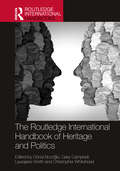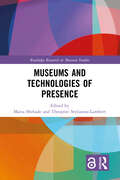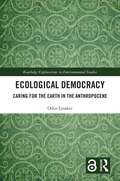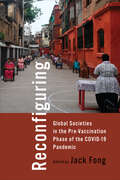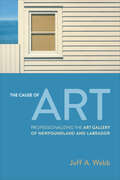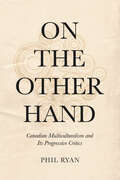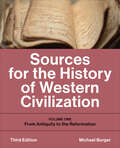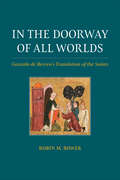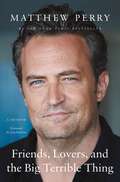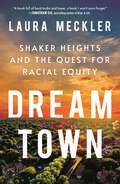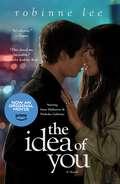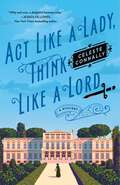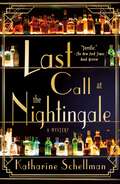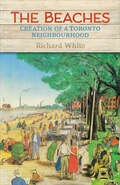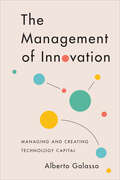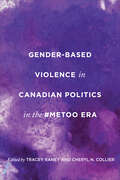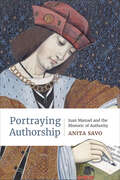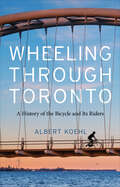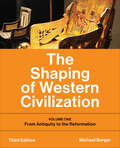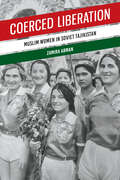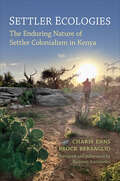- Table View
- List View
The Routledge International Handbook of Heritage and Politics (Routledge Handbooks on Museums, Galleries and Heritage)
by Gönül Bozoğlu Gary Campbell Laurajane Smith Christopher WhiteheadThe Routledge International Handbook of Heritage and Politics surveys the intersection of heritage and politics today and helps elucidate the political implications of heritage practices. It explicitly addresses the political and analyses tensions and struggles over the distribution of power. Including contributions from early-career scholars and more established researchers, the Handbook provides global and interdisciplinary perspectives on the political nature, significance and consequence of heritage and the various practices of management and interpretation. Taking a broad view of heritage, which includes not just tangible and intangible phenomena, but the ways in which people and societies live with, embody, experience, value and use the past, the volume provides a critical survey of political tensions over heritage in diverse social and cultural contexts. Chapters within the book consider topics such as: neoliberal dynamics; terror and mobilisations of fear and hatred; old and new nationalisms; public policy; recognition; denials; migration and refugeeism; crises; colonial and decolonial practice; communities; self- and personhood; as well as international relations, geopolitics, soft power and cooperation to address global problems.The Routledge International Handbook of Heritage and Politics makes an intervention into the theoretical debate about the nature and role of heritage as a political resource. It is essential reading for academics and students working in heritage studies, museum studies, politics, memory studies, public history, geography, urban studies and tourism.
Museums and Technologies of Presence (Routledge Research in Museum Studies)
by Maria Shehade Theopisti Stylianou-LambertIn view of the ever-increasing use of interactive and emerging technologies in museum spaces, Museums and Technologies of Presence rethinks the role of such technologies as potential facilitators of presence and as vehicles for offering new, immersive, and embodied visitor experiences.This edited collection presents theoretical approaches and case studies that explore how presence can be experienced in museum spaces and what role technology can play in visitor experiences. It considers the theoretical underpinnings of the concept ‘presence’ for museum spaces, offering a critical examination of how immersive and other emerging technologies can affect, diminish or enhance our sense of presence and embodiment. Through an international range of case studies and innovative projects, this volume considers emerging technologies – including virtual reality, augmented reality, interactive (multisensory) installations, and AI – alongside different aspects of presence, including immersion, embodiment, empathy, emotion, engagement, and affect.Taking an interdisciplinary approach, Museums and Technologies of Presence will be beneficial to those researching or studying in the fields of Museum Studies, Digital Humanities, Computer Science, Information Science, and Digital Media. It will also be useful to museologists, curators, and artists who are interested in developing immersive experiences, experimental new media, and immersive aesthetics.
Ecological Democracy: Caring for the Earth in the Anthropocene (Routledge Explorations in Environmental Studies)
by Odin LysakerEcological Democracy offers an original, thought-provoking, and engaging treatment of why and how democracy should be re-imagined in reaction to today’s ecological crisis. The book explains that one need to re-imagine both the view on nature and democratic ideals within the same framework in the Anthropocene, the present geological epoch of human-made instability in the Earth system and its planetary boundaries. This book proposes unique and challenging readings of green political theory and its development of ecological democracy in the last four decades. The book is the first to offer a systematic and detailed interpretation of the role of critical theory vis-à-vis green political theory through an update regarding current non-anthropocentric critical theorists and how they may contribute to the further development of ecological democracy. Ecological Democracy builds further on deep ecology, ecophenomenology, and animism by articulating an ecocentric view on nature which defends an intrinsic moral value of all existence as well as formulating the democratic principle of all ecologically affected parties.This book provides a sophisticated, convincing, and accessible argument for how to re-imagine ecological democracy as ecocentrism in practice: ecological love. To love ecologically means caring for and encountering all existence on the Earth and in the cosmos. This book is multi-disciplinary and will be of great value to researchers as well as undergraduate and postgraduate students from many disciplines.The Open Access version of this book, available at http://www.taylorfrancis.com, has been made available under a Creative Commons [Attribution-Non Commercial-No Derivatives (CC-BY-NC-ND)] 4.0 license.
Habits of Grace: Enjoying Jesus Through The Spiritual Disciplines
by David Mathis John PiperThree seemingly unremarkable principles shape and strengthen the Christian life: listening to God’s voice, speaking to him in prayer, and joining together with his people as the church. Though seemingly normal and routine, the everyday “habits of grace” we cultivate give us access to these God-designed channels through which his love and power flow—including the greatest joy of all: knowing and enjoying Jesus.
Advanced Practice Psychiatric Nursing: From Bedside To Boardroom
by Rebecca M. Patton Margarete L. Zalon Ruth LudwickReconfiguring Global Societies in the Pre-Vaccination Phase of the COVID-19 Pandemic
by Jack FongReconfiguring Global Societies in the Pre-Vaccination Phase of the COVID-19 Pandemic examines lived experiences of the COVID-19 pandemic in communities and societies around the world before the arrival of vaccines. This collection presents analyses of scholars from eight countries, all of whom were engaged in the unfolding crisis of social forces across the world. This timely volume conveys valuable insights about how public officials, the state, healthcare workers, and, ultimately, citizens responded to consequences of the pandemic upon not only the body but also social relations in community, city, and society. The contributing scholars document how state apparatuses, urban configurations, places of employment, legal structures, and ways of life responded to crisis-altered social conditions during the pandemic. The book investigates what societies experiencing crisis around the world reveal about the state’s efficacy and inefficacy in fulfilling its social contract for its citizens, especially on unresolved issues related to social relations based on politics, race, ethnicity, gender, and crime. This collection brings together a cross section of scholars experiencing the same temporal moment of crisis together, watching and observing how the pandemic of their age uncoiled itself into the fabric of community, onto the institutions and bureaucracies of society, and into the most intimate confines of the home.
The Cause of Art: Professionalizing the Art Gallery of Newfoundland and Labrador
by Jeff WebbIn 1949, Newfoundland and Labrador had a widely celebrated oral culture but little visual art. After entering the Canadian federation, recreational painters worked to create a venue for the display of art. The Cause of Art tells the story of the advocates, curators, and professional artists who laid the foundation for an artistic community in the province. The Memorial University Art Gallery was the site of a struggle between recreational painters who aspired to express their creative impulse and develop a Newfoundland art, and curators who wanted artists to participate in the Canadian art market and international artistic movements. The book recounts the history of passionate and strong-willed curators and cultural administrators who fought for control of the gallery. It reveals how they appealed to competing conceptions of professionalization, as well as diverse political and aesthetic preferences. Based on extensive archival research in previously unexamined collections, and oral interviews with key informants, this book examines a cultural institution that is widely remembered as the centre of the cultural renaissance in late twentieth-century Newfoundland and Labrador. As a result, The Cause of Art illuminates the relationship between the state and the university during a key period in the modernization of the province.
On the Other Hand: Canadian Multiculturalism and Its Progressive Critics
by Phil RyanFor many, Canadian multiculturalism represents the hope that we can build a society in which people who have come from all corners of the world can fully participate without first subverting or erasing their unique identities. Many progressive critics, however, dismiss this hope as an illusion that serves to mask ongoing racism and inequality. Foregrounding the capitalist nature of the Canadian state and society, On the Other Hand examines the arguments of a range of progressive critics of Canadian multiculturalism. An exercise in “critical listening,” the book aims to both communicate and assess these progressive critiques. It proposes conditions for the intelligibility of social science analysis in general and reflects on the requirements for effective progressive thought and writing. Grounded in a political economy approach, the book argues that capitalism and the capitalist nature of the state must be integrated into our analysis of multiculturalism, immigration policy, and persistent racism. On the Other Hand reveals how progressive critiques can identify real limits of multiculturalism: limits of which we must be aware if we are either to endorse them or seek to transcend them.
Sources for the History of Western Civilization: Volume One: From Antiquity to the Reformation, Third Edition
by Michael BurgerSources for the History of Western Civilization is a primary source reader designed specifically to allow undergraduate students to interact with historical documents. Michael Burger provides only the editorial guidance that students truly require, without unnecessary interventions. The third edition gives special stress to certain genres, including letters and biographical writings, to facilitate comparisons across time. Introductions to sources are brief, encouraging students to make their own assessments and giving instructors the freedom to supplement where desired. The third edition features substantive revisions and additional coverage of key topics throughoutas well as new material on the Crusades, Jewish persecution, and European expansion.
In the Doorway of All Worlds: Gonzalo de Berceo’s Translation of the Saints (Toronto Iberic #89)
by Robin M BowerThe thirteenth-century poet Gonzalo de Berceo is the first named author of Old Spanish letters and the most prolific contributor to the emergence of the body of learned vernacular verse known as the mester de clerecía. In the Doorway of All Worlds focuses on the four hagiographies Berceo produced as a unified body of poetic expression and world-building. Robin M. Bower traces the poet’s intricate juxtaposition of contraries to shed light on a poetic world that will innovate a deceptively simple poetic vernacular and elevate its capacity to express nuance, power, and mystery. The book examines the entanglements that bind formal and lexical choices, the inscription of performance sites and audiences, and problematic source authority. It argues that Berceo’s elaboration of a poetic vernacular was wholly enmeshed in the immediate human, experiential world and the diverse cultural, religious, linguistic, and literary contexts that framed it. The book also highlights how Berceo invented a literary vernacular that befits the spoken idiom not only for the crafting of learned fictions, but for giving linguistic shape to the ineffable. In the Doorway of All Worlds ultimately reveals how Berceo freed the meanings trapped in relics, shrines, and the impenetrable texts from which he translated the saints to circulate in a new time.
Friends, Lovers, and the Big Terrible Thing: A Memoir
by Matthew PerryINSTANT #1 NEW YORK TIMES BESTSELLER#1 INTERNATIONAL BESTSELLER The BELOVED STAR OF FRIENDS takes us behind the scenes of the hit sitcom and his struggles with addiction in this “CANDID, DARKLY FUNNY...POIGNANT” memoir (The New York Times) A MOST ANTICIPATED BOOK by Time, Associated Press, Goodreads, USA Today, and more!“Hi, my name is Matthew, although you may know me by another name. My friends call me Matty.”So begins the riveting story of acclaimed actor Matthew Perry, taking us along on his journey from childhood ambition to fame to addiction and recovery in the aftermath of a life-threatening health scare. Before the frequent hospital visits and stints in rehab, there was five-year-old Matthew, who traveled from Montreal to Los Angeles, shuffling between his separated parents; fourteen-year-old Matthew, who was a nationally ranked tennis star in Canada; twenty-four-year-old Matthew, who nabbed a coveted role as a lead cast member on the talked-about pilot then called Friends Like Us. . . and so much more.In an extraordinary story that only he could tell—and in the heartfelt, hilarious, and warmly familiar way only he could tell it—Matthew Perry lays bare the fractured family that raised him (and also left him to his own devices), the desire for recognition that drove him to fame, and the void inside him that could not be filled even by his greatest dreams coming true. But he also details the peace he’s found in sobriety and how he feels about the ubiquity of Friends, sharing stories about his castmates and other stars he met along the way. Frank, self-aware, and with his trademark humor, Perry vividly depicts his lifelong battle with addiction and what fueled it despite seemingly having it all. Friends, Lovers, and the Big Terrible Thing is an unforgettable memoir that is both intimate and eye-opening—as well as a hand extended to anyone struggling with sobriety. Unflinchingly honest, moving, and uproariously funny, this is the book fans have been waiting for.
Dream Town: Shaker Heights and the Quest for Racial Equity
by Laura MecklerCan a group of well-intentioned people fulfill the promise of racial integration in America?In this searing and intimate examination of the ideals and realities of racial integration, award-winning Washington Post journalist Laura Meckler tells the story of a decades-long pursuit in Shaker Heights, Ohio, and uncovers the roadblocks that have threatened progress time and again—in housing, in education, and in the promise of shared community.In the late 1950s, Shaker Heights began groundbreaking work that would make it a national model for housing integration. And beginning in the seventies, it was known as a crown jewel in the national move to racially integrate schools. The school district built a reputation for academic excellence and diversity, serving as a model for how white and Black Americans can thrive together. Meckler—herself a product of Shaker Heights—takes a deeper look into the place that shaped her, investigating its complicated history and its ongoing challenges in order to untangle myth from truth. She confronts an enduring, and troubling, question—if Shaker Heights has worked so hard at racial equity, why does a racial academic achievement gap persist?In telling the stories of the Shakerites who have built and lived in this community, Meckler asks: What will it take to fulfill the promise of racial integration in America? What compromises are people of all races willing to make? What does success look like, and has Shaker achieved it? The result is a complex and masterfully reported portrait of a place that, while never perfect, has achieved more than most and a road map for communities that seek to do the same. Includes black-and-white images.
The Idea of You: A Novel
by Robinne LeeNow an original movie on Prime Video starring Anne Hathaway and Nicholas Galitzine! When Solène Marchand, the thirty-nine-year-old owner of a prestigious art gallery in Los Angeles, takes her daughter, Isabelle, to meet her favorite boy band, she does so reluctantly and at her ex-husband’s request. The last thing she expects is to make a connection with one of the members of the world-famous August Moon. But Hayes Campbell is clever, winning, confident, and posh, and the attraction is immediate. That he is all of twenty years old further complicates things.What begins as a series of clandestine trysts quickly evolves into a passionate relationship. It is a journey that spans continents as Solène and Hayes navigate each other’s disparate worlds: from stadium tours to international art fairs to secluded hideaways in Paris and Miami. And for Solène, it is as much a reclaiming of self, as it is a rediscovery of happiness and love. When their romance becomes a viral sensation, and both she and her daughter become the target of rabid fans and an insatiable media, Solène must face how her new status has impacted not only her life, but the lives of those closest to her.
Act Like a Lady, Think Like a Lord: A Mystery (Lady Petra Inquires #1)
by Celeste ConnallyBridgerton meets Agatha Christie in Act Like a Lady, Think Like a Lord, a dazzling first entry in a captivating new Regency-era mystery series with a feminist spin from Celeste Connally.London, 1815. Lady Petra Forsyth, daughter of the Earl of Holbrook, has made a shocking proclamation. After losing her beloved fiancé in an accident three years earlier, she announces in front of London’s loosest lips that she will never marry. A woman of independent means—and rather independent ways—Petra sees no reason to cede her wealth and freedom to any man now that the love of her life is gone. Instead, she plans to continue enjoying the best of society without any expectations.But when ballroom gossip suggests that a longtime friend has died of a fit due to her “melancholia” while in the care of a questionable physician, Petra vows to use her status to dig deeper. Just as Petra has reason to believe her friend is alive, a shocking murder proves more danger is afoot than she thought. And the more determined Lady Petra becomes in uncovering the truth, the more her own headstrong actions and desire for independence are used against her, putting her own freedom—and possibly her life—in jeopardy.
Last Call at the Nightingale: A Mystery (The Nightingale Mysteries #1)
by Katharine SchellmanFirst in a captivating Jazz age mystery series from author Katharine Schellman, Last Call at the Nightingale beckons readers into a darkly glamorous speakeasy where music, liquor, and secrets flow."Schellman is at the top of her craft and delivers a murder mystery with clever twists and turns and memorable personalities."—Denny S. Bryce, Bestselling Author of Wild Women and the BluesNew York, 1924. Vivian Kelly's days are filled with drudgery, from the tenement lodging she shares with her sister to the dress shop where she sews for hours every day.But at night, she escapes to The Nightingale, an underground dance hall where illegal liquor flows and the band plays the Charleston with reckless excitement. With a bartender willing to slip her a free glass of champagne and friends who know the owner, Vivian can lose herself in the music. No one asks where she came from or how much money she has. No one bats an eye if she flirts with men or women as long as she can keep up on the dance floor. At The Nightingale, Vivian forgets the dangers of Prohibition-era New York and finds a place that feels like home.But then she discovers a body behind the club, and those dangers come knocking.Caught in a police raid at the Nightingale, Vivian discovers that the dead man wasn't the nameless bootlegger he first appeared. With too many people assuming she knows more about the crime than she does, Vivian finds herself caught between the dangers of the New York's underground and the world of the city's wealthy and careless, where money can hide any sin and the lives of the poor are considered disposable...including Vivian's own.
The Beaches: Creation of a Toronto Neighbourhood
by Richard WhiteThe Beaches is one of Toronto’s best known and most admired neighbourhoods. It has no striking works of architecture or splendid public spaces, no must-see galleries or public institutions, and no associations with historic events or great celebrities – the sort of things that create neighbourhood reputations and draw visitors. It does, however, have an attractive character, and it is this character that Richard White seeks to understand, offering insights into how it came to be and why it has endured. With an eye to the broader historical context, The Beaches recounts the neighbourhood’s initial colonial settlement, its development as a lakeside recreational community in the late nineteenth century, its emergence as a streetcar suburb after 1900, its maturation in the 1920s and 1930s, its relative decline in the 1950s and 1960s, and its revival in the 1970s and beyond. Utilizing a wide range of archival records, including council minutes, plans of subdivision, newspapers, public land records, city directories, assessment rolls, and historical photographs – as well as the present-day landscape – The Beaches reveals the various forces, public and private, local and international, that shaped this cherished urban neighbourhood.
The Management of Innovation: Managing and Creating Technology Capital
by Alberto GalassoDespite the importance of innovation for the growth of firms, industries, and the national economy, the strategic tools available to effectively manage and create new technologies are often neglected by entrepreneurs and corporate managers. The Management of Innovation examines how firms can leverage and create technology capital. Over the past two decades, economists and management scholars have developed several new insights into how large companies and startups can be more innovative. Many of these research findings have not yet reached management practice. Alberto Galasso aims to address this issue by providing an accessible overview of the innovation literature and a discussion of the latest research findings. The analysis considers the two key stages of the innovation process: technology management and technology creation. Each stage involves complex managerial decisions related to resource allocation and the assessment of relevant costs and benefits. This book examines the most frequent trade-offs that shape the innovation process across these two stages. It also provides an introduction to intellectual property and patent analytics. The Management of Innovation provides MBA students and practitioners with tools and insights to innovate successfully.
Gender-Based Violence in Canadian Politics in the #MeToo Era
by Tracey Raney Cheryl N. CollierGender-based violence in politics is a significant and growing problem that threatens the democratic process in Canada. Despite its prevalence, little academic research has been conducted on this topic to date. Gender-Based Violence in Canadian Politics in the #MeToo Era raises awareness of and presents new innovative research on this timely and pressing public issue. Here, leading experts from across Canada uncover critical new insights and identify potential solutions that would help address gender-based violence in politics, improve gender equality, and strengthen Canadian democracy. Using an intersectional lens, chapters range in their approaches; offer new concepts and measures of gender-based violence in online political spaces, political media coverage and cartoons, campaigns, municipal politics, and legislatures; and explore Indigenous ways of knowing about gender-based violence in Canadian politics. Additionally, the volume presents recommendations for decision-makers, policymakers, anti-violence advocates, and the academic community on how to best address the problem of gender-based violence in the political sphere.
Portraying Authorship: Juan Manuel and the Rhetoric of Authority (Toronto Iberic #88)
by Anita SavoPortraying Authorship argues that the medieval Castilian writer Juan Manuel fashioned a seemingly modern authorial persona from the accumulation and synthesis of medieval authorial roles. In the manuscript culture of medieval Castile and across Latin Europe, writers typically referred to their work in ways that corresponded to their role in the bookmaking process: scribes took credit for preserving the works of others, compilers for combining disparate texts in productive ways, commentators for explaining obscure works, and authors for writing their own words. Combining literary analysis with book history, Anita Savo reveals how Juan Manuel forged his authorial persona, “Don Juan,” by adopting all four medieval writerly roles, thereby reaping the ethical benefits of each one. Each chapter in Portraying Authorship highlights a different authorial role to show how Don Juan – and others who wrote in his name – assumed responsibility for that role and adapted its rhetoric to his vernacular literary project. The book concludes that Don Juan’s authorial self-portrait not only gave the humanist writers of the fifteenth century a model to imitate, but also persuaded subsequent scribes, editors, and translators to portray him as an individual author. In doing so, Portraying Authorship illuminates how Juan Manuel’s concept of authorship helped to secure him a privileged position in narratives of Spanish literary history.
Wheeling through Toronto: A History of the Bicycle and Its Riders
by Albert KoehlHighlighting an important yet often ignored part of Toronto’s transportation story, Wheeling through Toronto chronicles the history of the bicycle and reveals a way forward for a world in climate crisis. Throughout its history in Toronto, the bicycle’s place on the roads and in public esteem has fluctuated wildly: flaunted as fashionable, disparaged and derided, rescued from looming obscurity, and promoted as a way to respond to the challenges of the day. What is it about the simple bicycle that it can be so loved by some yet despised and detested by others? Wheeling through Toronto offers a 130-year ride from the 1890s to the present to help answer this question. Albert Koehl, a Toronto lawyer and leading cycling advocate, chronicles the tumultuous history of this mode of transportation from the bicycle craze at the turn of the century, to the rise of the car and the motorway in the 1950s, to the intensifying cry for active transportation in the 1990s and into pandemic times. In an era of catastrophic climate events, Wheeling through Toronto highlights how the bicycle should be celebrated not only as hope for the future, but also for its affordability, for its contribution to clean and healthy mobility, and because it brings happiness and joy to so many. Drawing on archival materials, newspapers, and personal interviews, and full of fascinating vignettes, this book presents the story of how we got here and what Torontonians need to know as we pedal forward.
The Shaping of Western Civilization: Volume One: From Antiquity to the Reformation, Third Edition
by Michael BurgerIn this overview, Michael Burger’s pedagogical goal is to provide a brief historical narrative of Western civilization to enable students to engage more fully with primary sources. The no-frills, uncluttered format and well-written, one-author approach make this book an affordable yet valuable asset for every history student. The third edition features stylistic and substantive revisions throughout. Volume One includes additional coverage of the neolithic revolution, the evolving self-definition of the West, race in the Middle Ages, the Crusades, and the conquest of the Americas, as well as new and improved maps.
Coerced Liberation: Muslim Women in Soviet Tajikistan
by Zamira AbmanIn 1924, the Bolshevik regime began an unprecedented campaign to forcibly emancipate the Muslim women of Tajikistan. The emancipatory reforms included unveiling women, passing progressive family code laws, and educating women. By the 1950s, the Soviet regime largely succeeded in putting an end to veiling, child marriage, polygamy, and bride payments. Yet today there is a resurgence in these practices the Bolsheviks claimed to have eliminated. Coerced Liberation reveals that the Soviet regime transformed the lives of urban women within a single generation but without lasting effect. Drawing on unique primary sources, the book examines why this occurred. It addresses questions that are pertinent to ongoing debates in the international arena: What happens when an outside force attempts to modernize a society deeply rooted in centuries of patriarchal norms and values? In what ways can a devout religious rural community respond to, survive, and adapt to such interventions? And how does a state-centred, top-down approach towards women’s emancipation work? Coerced Liberation presents critical insights for readers interested in gender dynamics within Muslim communities, the roles of women in Islam, the resurgence of Islam in former colonial territories, the effectiveness of a top-down approach towards women’s movements, and more.
Settler Ecologies: The Enduring Nature of Settler Colonialism in Kenya
by Charis Enns Brock BersaglioSettler Ecologies tells the story of how settler colonialism becomes memorialized and lives on through ecological relations. Drawing on eight years of research in Laikipia, Kenya, Charis Enns and Brock Bersaglio use immersive methods to reveal how animals and plants can be enrolled in the reproduction of settler colonialism. The book details how ecological relations have been unmade and remade to enable settler colonialism to endure as a structure in this part of Kenya. It describes five modes of violent ecological transformation used to prolong structures of settler colonialism: eliminating undesired wild species; rewilding landscapes with more desirable species to settler ecologists; selectively repeopling wilderness to create seemingly more inclusive wild spaces and capitalize on biocultural diversity; rescuing injured animals and species at risk of extinction to shore up moral support for settler ecologies; and extending settler ecologies through landscape approaches to conservation that scale wild spaces. Settler Ecologies serves as a cautionary tale for future conservation agendas in all settler colonies. While urgent action is needed to halt global biodiversity loss, this book underscores the need to continually question whether the types of nature being preserved advance settler colonial structures or create conditions in which ecologies can otherwise be (re)made and flourish.
